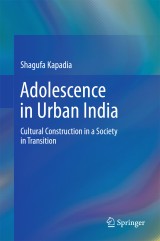Details

Adolescence in Urban India
Cultural Construction in a Society in Transition|
96,29 € |
|
| Verlag: | Springer |
| Format: | |
| Veröffentl.: | 11.10.2017 |
| ISBN/EAN: | 9788132237334 |
| Sprache: | englisch |
Dieses eBook enthält ein Wasserzeichen.
Beschreibungen
<p>Set against the backdrop of social change and globalization, this book presents the contents and contours of adolescence in contemporary urban India. Based on the trends derived from a series of mixed-method studies with adolescent girls and boys, and parents from urban upper middle class families, it explores adolescents’ and parents’ interpretations of the stage of adolescence, illustrates views on parenting, and discusses approaches to interpersonal disagreements to derive a framework of the parent-adolescent relationship. Drawing from the cultural-contextual perspective of human development, the book in its essence offers a culturally and contextually sensitive model of adolescence that is shaped along the central tenets of family interdependence, harmony, and sensitivity to parental concerns. Highlighted as well are aspects that have remained mostly unexplored, for example, adolescents’ capacity for empathy and perspective taking, and emerging issues of autonomy in a primarily relational culture. At a broader level, the book reflects upon the interplay of cultural continuity and change, and contributes to an understanding of globalizing influences on human development. Overall, the depiction of adolescent development captured in the book has significant implications for enhancing family relationships and fostering self-growth---elements that are crucial for positive youth development.The book will be of immense use to scholars in human development, psychology, and allied fields as well as to practitioners who work with adolescents.</p>
<b>Chapter 1</b> Culture, Context and Development.- <b>Chapter 2</b> Adolescence: A Sociocultural Construction.- <b>Chapter 3</b> Adolescence, the Stage; Adolescent, the Person.- <b>Chapter 4</b> Parent-Adolescent Relationship: A Circle of Care, Respect, and Faith .- <b>Chapter 5</b> Uncertainties, Insecurities, and Worries: The Bane of Globalization.- <b>Chapter 6 </b>Conclusions, Reflections, and Implications.- Appendices.
Shagufa Kapadia, PhD, is a Professor in the Department of Human Development and Family Studies. She is the department Chair and Coordinator of the Center of Advanced Study (CAS) in Human Development, and Hon. Director of the Women’s Studies Research Center at the Maharaja Sayajirao University of Baroda, Vadodara, India. Her research interests center on culture and human development with a focus on adolescent and youth development, parenting and socialization, and gender and women’s issues. She has significant international cross-cultural research and teaching experience. She is on the review and editorial boards of the journals <i>Culture and Psychology, Emerging Adulthood</i>, and <i>Psychological Studies.</i> Prof. Kapadia has received prestigious awards and fellowships, including the Fulbright Senior Research Fellowship (2003-04), and the Shastri Indo-Canadian Faculty Research Award (2006 and 2010). She is the India coordinator of the International Society for the Study of Behavioral Development (ISSBD) and a Founding Board member of the International Society for the Study of Emerging Adulthood (SSEA).
<p>Set against the backdrop of social change and globalization, this book presents the contents and contours of adolescence in contemporary urban India. Based on the trends derived from a series of mixed-method studies with adolescent girls and boys, and parents from urban upper middle class families, it explores adolescents’ and parents’ interpretations of the stage of adolescence, illustrates views on parenting, and discusses approaches to interpersonal disagreements to derive a framework of the parent-adolescent relationship. Drawing from the cultural-contextual perspective of human development, the book in its essence offers a culturally and contextually sensitive model of adolescence that is shaped along the central tenets of family interdependence, harmony, and sensitivity to parental concerns. Highlighted as well are aspects that have remained mostly unexplored, for example, adolescents’ capacity for empathy and perspective taking, and emerging issues of autonomy in a primarily relational culture. At a broader level, the book reflects upon the interplay of cultural continuity and change, and contributes to an understanding of globalizing influences on human development. Overall, the depiction of adolescent development captured in the book has significant implications for enhancing family relationships and fostering self-growth—elements that are crucial for positive youth development. The book will be of immense use to scholars in human development, psychology, and allied fields as well as to practitioners who work with adolescents.</p>
<p>Offers a culturally and contextually grounded understanding of adolescence in urban India</p><p>Presents indigenous frameworks of parenting adolescents and the parent-adolescent relationship,derived from the perspectives of both adolescents and parents</p><p>Illustrates the nature and process of parent-adolescent disagreements in the changing Indian society</p><p>Includes supplementary material: sn.pub/extras</p>

















